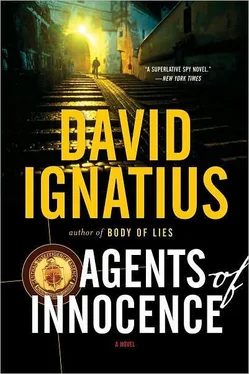David Ignatius - Agents of Innocence
Здесь есть возможность читать онлайн «David Ignatius - Agents of Innocence» весь текст электронной книги совершенно бесплатно (целиком полную версию без сокращений). В некоторых случаях можно слушать аудио, скачать через торрент в формате fb2 и присутствует краткое содержание. Жанр: Шпионский детектив, на английском языке. Описание произведения, (предисловие) а так же отзывы посетителей доступны на портале библиотеки ЛибКат.
- Название:Agents of Innocence
- Автор:
- Жанр:
- Год:неизвестен
- ISBN:нет данных
- Рейтинг книги:3 / 5. Голосов: 1
-
Избранное:Добавить в избранное
- Отзывы:
-
Ваша оценка:
- 60
- 1
- 2
- 3
- 4
- 5
Agents of Innocence: краткое содержание, описание и аннотация
Предлагаем к чтению аннотацию, описание, краткое содержание или предисловие (зависит от того, что написал сам автор книги «Agents of Innocence»). Если вы не нашли необходимую информацию о книге — напишите в комментариях, мы постараемся отыскать её.
Agents of Innocence — читать онлайн бесплатно полную книгу (весь текст) целиком
Ниже представлен текст книги, разбитый по страницам. Система сохранения места последней прочитанной страницы, позволяет с удобством читать онлайн бесплатно книгу «Agents of Innocence», без необходимости каждый раз заново искать на чём Вы остановились. Поставьте закладку, и сможете в любой момент перейти на страницу, на которой закончили чтение.
Интервал:
Закладка:
“Andiamo!” said Anna. Let’s go! Her husband gave her a wink.
The general’s wife collected Marsh an hour later at the Excelsior Hotel on the Via Veneto and drove him to a tennis club north of the city. It was an elegant Roman establishment, with red-clay courts and street urchins in white shorts acting as ball boys. As they began to warm up, a look of disappointment showed on Anna’s face. Her American guest, though dressed in expensive tennis clothes from head to toe, was a player of modest skills. After they had played a set, Marsh proposed that they take a breather. As they walked toward the clubhouse, Anna Armani noticed that her guest was limping slightly.
“War wound,” said Marsh.
It was true. He had sprained his ankle badly once in Saigon running along the pavement during a rainstorm. The general’s wife nodded sweetly and led him to the clubhouse. She rubbed the tender ankle and held an icepack against it. The American’s spirits improved markedly.
“What a wonderful country!” said Marsh as he sat on the clubhouse patio, gazing out at the courts and the Roman hills beyond. He was sipping a Campari soda. The midday heat had passed and the courts were beginning to fill up with Italians: members of parliament, prominent journalists, executives of the Italian national oil company, ENI. Anna Armani explained that the club was frequented mostly by people connected with the Socialist Party.
“Do you know what I love about Italy?” said Marsh grandly. “You can buy anything here. Clothes. Ideas. People. That’s why this country is so stable beneath the surface. Because everything has its price!”
“Everything?” asked Anna coquettishly.
“Everything but love,” answered Marsh. He imagined that he was being charming.
“Perhaps you will live here someday, since you love Italy so much.”
“Perhaps,” said Marsh. “But my area of expertise lies a bit further east.”
“I hope you will come to Rome. My husband says you are a clever man.”
“Oh does he really now? He should be more discreet.”
“Come now!” said Anna. “It is not a secret that you are a clever man.”
She adjusted the icepack on his ankle. Marsh chided himself, Don’t be so uptight. Her husband already knows enough about the CIA to fill a book.
“Will you be in Rome long?” asked Anna. “We would love to have you to dinner.”
“I’m afraid it’s just a short trip. Just one meeting, really. I’ll probably be leaving in a day or so.”
“What a shame!” said Anna. “To come so far.”
There was a lull in the conversation. They gazed toward the tennis courts and watched the players, chattering in Italian as they batted the balls back and forth on the red clay. Marsh noticed a tall Arab playing on one of the courts. He was a distinguished-looking man, with long legs and a slice backhand.
“Who’s he?” asked Marsh.
“I don’t know,” said Anna. “One of the Arabs.”
“Are there many Arabs living in Rome these days?”
“They are everywhere!” said Anna disgustedly. “They are ruining prices in the stores. Soon the signs in the shops on Via Condotti will be only in Arabic.”
“And Palestinians?” asked Marsh, thinking he might gather a little intelligence. “Are there many Palestinians in Rome?”
“I don’t know,” answered Anna. “They all look the same to me.”
“Do you find them attractive?” asked Marsh.
“Ugh!” said Anna Armani. “I am one of those things in Italy that Arab money cannot buy.”
Marsh was in heaven. He chatted for more than an hour with the Italian woman. She seemed fascinated and besides, Marsh told himself, she was practically one of the family. But despite her ministrations with the icepack, his ankle still hurt. On the way back to the hotel, Marsh stopped in a store near the Via Veneto and bought himself a carved wooden cane.
Marsh sometimes struck people as a fool, but he wasn’t. Shy by nature, he had taught himself to be outgoing and enthusiastic by an act of will. Like many insecure people, he sometimes behaved with a certain pomposity and braggadocio. But he cared as much about the agency as any of his colleagues. He simply had a different style.
Marsh was more cautious and less instinctual than some of his fellow officers. He was one of those people who believed that slow and steady would win the race, who regarded himself as the tortoise in life’s never-ending contest with the hare. He brought this methodical approach to his handling of agents. He was determinedly uncreative. Creativity got people killed, Marsh told himself. Playing by the book kept them alive.
In the world of recruiting agents, playing by the book meant contracts that were clearly understood by both sides, ones that imposed on the slippery and deceitful world of espionage some of the order of the legal world. Marsh liked relationships that were clear and straightforward. I buy your services for an agreed-upon price; you agree to deliver certain material in exchange; we both profit by the relationship. He understood that sort of arrangement, and he believed in it. Each side knew the risks and rewards. It was a transaction between adults. What troubled Marsh were relationships that were more complicated, where subtler and less orderly motivations prevailed. Those relationships-based on frail human emotions like friendship, respect, and loyalty-were the dangerous ones. And perhaps also less moral.
Anna reported her conversation with Marsh to her husband that night. He rubbed his eyeballs and lit a thick French cigarette.
“How long is he here?” asked General Armani.
“Long enough for one meeting. Perhaps only a day.”
So he is meeting an agent, the general thought to himself.
“What was on his mind?” asked the general.
“Let me see,” said Anna. “He talked about buying things. He talked about Italy. He asked about an Arab who was playing tennis. He asked whether there were many Palestinians in Rome. He asked whether I found them attractive. He seemed interested in Arabs.”
“He has Arabs on the brain,” said the general.
“Yes, maybe. And me. He has me on the brain, too. I think maybe he wanted to sleep with me, but he was too shy to say so.”
“Thank you, my dear,” said General Armani, giving her a kiss on the cheek and a pat on the bottom. He lit another cigarette and went to the phone.
“The American is in Rome to meet an Arab agent,” said General Armani in crisp Italian to one of his colleagues. “We could arrange surveillance, but what does it matter? He isn’t meeting an Italian!”
He hung up the phone. General Armani had done his duty and notified the appropriate authorities.
But nothing in Italy is ever quite that simple. The SID at the time was split into two factions. One was pro-Arab, the other pro-Israeli. General Armani was part of the latter faction. He made it a practice, from time to time, to pass along to the Israelis bits of information he thought would interest them. They reciprocated with information that was useful to the general. It was a trade, the universal commerce of the intelligence business.
“I’m going for a little walk, darling,” said the general. He strolled to a pay telephone several blocks away and dialed the number of an Israeli friend. The general knew the phone was tapped-his own people did the tapping-so he muffled his voice and arranged a quick rendezvous in a bar near his house.
When the Israeli arrived, General Armani came quickly to the point: A CIA man named Marsh was in town. He hadn’t said why, but it was a safe bet that he had come to meet an agent. It was also a good bet that his trip involved an Arab. Perhaps a Palestinian, the general said. He thought the Israeli government would like to know.
Читать дальшеИнтервал:
Закладка:
Похожие книги на «Agents of Innocence»
Представляем Вашему вниманию похожие книги на «Agents of Innocence» списком для выбора. Мы отобрали схожую по названию и смыслу литературу в надежде предоставить читателям больше вариантов отыскать новые, интересные, ещё непрочитанные произведения.
Обсуждение, отзывы о книге «Agents of Innocence» и просто собственные мнения читателей. Оставьте ваши комментарии, напишите, что Вы думаете о произведении, его смысле или главных героях. Укажите что конкретно понравилось, а что нет, и почему Вы так считаете.












